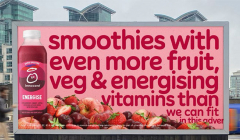
Innocent campaign is jam-packed with goodness
Neverland helps bring to life the amount of fruit, veg and vitamins in Innocent smoothies and juices

NABS’ stats for the first half of 2021 reveal worrying increase in low mood among employees across the industry.

Such is the impact on people’s mental health of the pandemic that commentators warned that an impending mental health crisis was a ‘looming second pandemic.’
It’s clear that this prediction is rooted for employees across the advertising industry with research from NABS showing a 14% increase in calls related to low mood since 2020.
According to NABS low mood has been a constant theme amongst callers during the Pandemic; alongside a need for financial support, emotional support and support with redundancy as top reasons for contacting NABS.
The research suggests that despite the strength of the industry bounce-back, reflected in both salary inflation and a ‘candidates market’ for many sectors of the industry; mental health and work pressures continue to take a toll on the industry’s most precious resource; its people.
We’re also anticipating challenges due to some employees’ and organisations’ differing expectations around hybrid and flexible working. We’re here to support everybody in the industry with their wellbeing throughout these difficult circumstances.
Diana Tickell, CEO, NABS
Yet while the emotional bounce-back from lockdown may not be as straightforward as the shifting positive trajectories of many agencies' bottom lines; the research also reveals that individuals are taking action to prioritise their own wellness.
The research shows that individuals are reaching out for help and also investing their time and energy in self-development. There has been a 48% increase year-on-year in attendance of Masterclasses (group coaching sessions), with sessions focusing on confidence being the most popular as attendees prepare to return to the office.
Other areas of growth include training in building rapport remotely and different ways of working as a team, a trend which reflects the continued working from home practices, as well as a move into hybrid working.
While Masterclasses and coaching centred on career and life change continue to thrive, as many employees across the industry continue to rethink their priorities. A shift reflected in both the headlines warning of ‘The Great Resignation’ in the wake of 2020 and the reality of record levels of staff churn across the industry.
Meanwhile, while the pandemic disproportionately impacted women; NABS research reveals there remains concerns from some working mothers about the effects of the pandemic on their careers.
Annabel McCaffrey, head of support, NABS, explains: “We’ve helped so many people this year with their finances. If someone needs to retrain or needs money to make ends meet, we can assist with a grant; we also support people with money management and debt management. We’re here for our industry through what continues to be a tough period, both emotionally and financially.”
Diana Tickell, CEO, NABS, added: “Our stats for the first half of 2021 reveal that as an industry we have to do more to support people's low mood before we start to see more increases in this area. Relying on summer breaks won’t be enough. This is especially important as we face new challenges over the next few months, and uncertainty and anxiety may increase as people start to focus on returning to the office.”
Tickell says she is ‘cautiously optimistic’ about where the industry is with Covid. However, she added: “We’re in a brace position for the end of furlough, with parts of our industry that are still struggling. We’re also anticipating challenges due to some employees’ and organisations’ differing expectations around hybrid and flexible working. We’re here to support everybody in the industry with their wellbeing throughout these difficult circumstances.”
Looks like you need to create a Creativebrief account to perform this action.
Create account Sign inLooks like you need to create a Creativebrief account to perform this action.
Create account Sign in